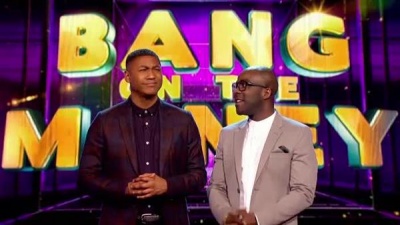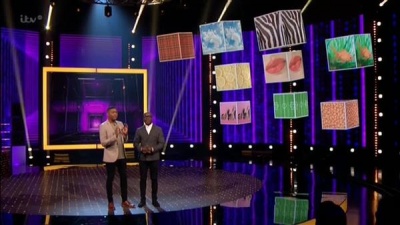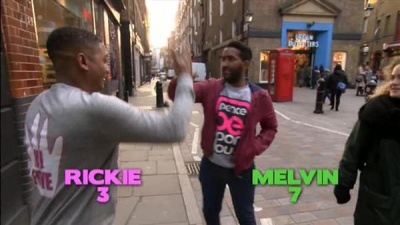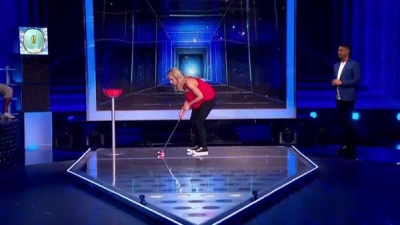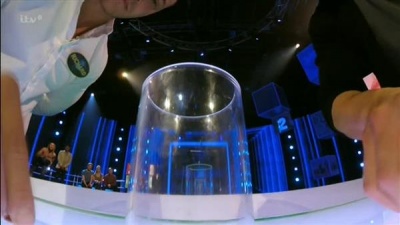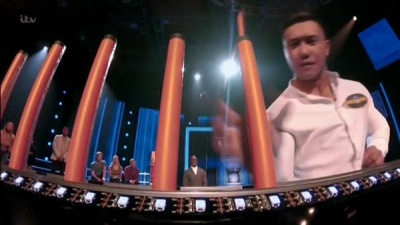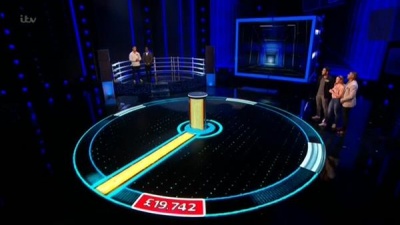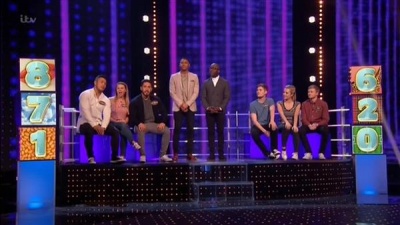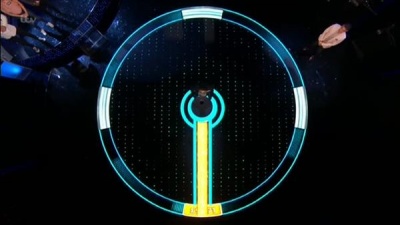Weaver's Week 2016-05-01
Last week | Weaver's Week Index | Next week
"Super Saturdays" was a success for ITV last year. Britain's Got Talent remains the one thing in entertainment to outsize Simon Cowell's ego. Play to the Whistle combines sport and comedy like Gok's Lunchbox combined cooking and comedy. Ninja Warrior UK turned into a breakout hit, and it's moved to a new slot in the depth of winter. What can fill those shoes? Who can go head-to-head against Michael McIntyre and hope to win? Step forward one Bungalowhead and his broadcasting chum.
Contents |
Bang on the Money
Thames for ITV, from 16 April
Yes! It's Melvin Odoom and Rickie Haywood Williams. The hosts of Pop Up Pop Quiz are back for a new light entertainment show that doesn't take itself too seriously.
Melvin Odoom works with the stars – Dick and Dom in Da Bungalow, The Basil Brush Show. And he slums it on low-rent spin-offs like The Xtra Factor (extended coverage of ITV's erstwhile singing show The X Factor). Rickie Haywood Williams hosted MTV News and did interviews for Myspace. Their biography claims they host a morning show on Kiss Radio, but this column does not get a listenable signal for that station.
The contest is between groups of three friends. They've applied as a team, and the contestants are all young. Contrast with what's showing over on BBC1: Michael McIntyre, an unadventurous comedian, safe for family viewing. Where BBC1 says "safe", ITV says "dull" and makes something with bite.
Rickie and Melvin tell us that the stars of the show are nine boxes. Nine boxes with symbols on the front – clouds, high heels, beans. Concealed inside each box is a flag, and on the flag is a digit from one to nine. We'll come to these digits in a moment.
The show begins with a lot of clutter. Meet the teams, with the inevitable zany video. Then there's a skit, in which Melvin and Rickie try to do something. Get high fives off people, or have a penalty shootout. (How we can tell this is not a 12 Yard format? The penalty shootout is done in a minute.)
One of the teams chose whether Rickie or Melvin will do better. Whichever team wins the skit gets to choose which two boxes are opened, and which of two digits they'll be playing for. Melvin and Rickie refer to these as "target numbers" every time. It gets wearing.
With all the introductions and set-up, it's almost ten minutes before we start playing the challenges. How can they improve this? Take a tip from Pointless, and shove the contestant intros into the main game. Show the wacky video while the first player steps up to their game.
The games themselves are interesting. Each has a clear objective: putt golf balls into a number of holes, fewer holes mean greater distance. Someone tuning in late can catch up easily. The games have a time limit, between one and two minutes. They are visual, and the directors use micro-cameras to pick up on the action.
Everything happens in real time, with action replays where needed. They've decided not to use "bullet time", they don't slow down the action like on The Cube and Reflex. The stage is black, with bright props. Ten years ago, a massive LED floor was wow-factor extravagance: now it's expected, run-of-the-mill.
In theory, a larger "target number" means a more difficult challenge. In practice, not always. Having fewer coins to pick up, that's easier. Putting into nine holes from three foot away seems easier than putting into one hole a long way away. So it's not always sensible to pick the low number, and a high number will influence the score.
We get three challenges: a solo game, a two-player match, and a three-player game. Both teams take part individually, both will win or lose on their own merits. The teams never ever go head-to-head. Even in the final, it's one team or the other team. Even in the "Rickie or Melvin" skit, the teams only compete by proxy.
And then the boxes are shut down. Yep, the "stars of the show" earlier, put away after half time.
Teams get to select their own difficulty for the final, they type their chosen number into a tablet. Blue-on-black tablet displays don't look good on screen – it's just about the only visual detail they've missed.
The difficulty for the final is the thousands part of their prize. Where a team won a challenge earlier, they keep the "target number"; where they failed, they record a 0. These three digits are sorted into descending order, and form the fragment of a thousand.
A tie is almost impossible (and we so don't want to see a £ZERO-£ZERO draw: this isn't Match of the Day). Everything rests on the final game – unless the teams have matched bids, in which case the highest won game from earlier decides it. Again, the challenge is strong – remove pegs before they get knocked over. Again, the production is strong – a mini camera points up at the contestant, we can literally see the pegs flying.
The losing team leaves with nothing. Not through any fault of their own, but because they've been beaten by a team that scored more. Melvin and Rickie cover up the hole, but it still feels a bit wrong.
The winning team then gets to play the final. One by one, they're asked to hit a glob containing their money. The glob goes around the edge of the large circular stage. At various points, the money glob can reverse direction. The idea is that the player hits the button at just the right moment, releasing a spear of light so that it will hit the glob.
We're not explaining this bit well, because we don't understand it. We don't understand it because the show doesn't explain it well. There's a delay between pressing the button and hitting the target: this isn't clear in visuals and it's not clear in verbals.
Anyway, one hit wins the amount of money that came down from the main game. Two hits wins twice that amount, and hits from all three players earns double double rewards – a potential prize of £39,948. Credits roll, Britain's Got Talent comes after the break.
What of the show as a whole? The individual segments work fine, the games make for good telly, they don't outstay their welcome. We like what they do to make the early rounds mean something without compromising later stages.
But we've problems with some of the overall production decisions. The teams don't compete against each other at all. Sooner or later, we'll see a team win all four challenges and still leave with nothing – that feels unjust. The show suffers from a very clunky start, there's a lot of exposition in the opening five minutes. Some of it could be shuffled later.
Melvin and Rickie go on about "target number", which feels more complex than it is.
We expect a "bang on" challenge would be one that can be lost in either direction. Pot four snooker balls: lose the challenge if you only pot three, lose the challenge if you pot five. But most of the games here are selecting a relative difficulty level – there are only four snooker balls to pot.
Could we solve these two problems in one? Teams are picking a "difficulty" or a "worth" or a "value". Just a change of language to make the show sound more pally.
We know that the turnaround from pilot to production was short, just a few weeks. Was Bang on the Money rushed out for this slot? It's played by young people, the hosts are rising stars, and it's very different from fusty old McIntyre on BBC1.
Raw ratings won't be decisive. The awkward production probably won't matter, not if the show brings in a young audience for the advertisers. We can envisage a young audience finding something before they go out of a Saturday night, and sticking around till the end.
Even better, Bang on the Money doesn't alienate older viewers. The final game is simple – anyone can pick it up. Viewers who tune in early for Britain's Got Talent will understand what is happening, even if they don't know why it's happening. And the final game is likely to end on a hit target, and almost certain to end on the team winning money. Feelgood entertainment, sets the mood for Cowell & Co.
So Bang on the Money has all the right elements, but some of the packaging needs a little work.
Countdown Update
We can move past James Hogan quickly; one win before he was defeated by Conrad Teixeira. A fan of the four-large selection, Conrad won eight games with a total of 806 points. Good enough for Finals Week, he might need luck to make the final.
Sean Cooke is on the cusp for Finals Week, five wins may or may not get him back in June. We won't see John Parke, Steve Heywood, or Hugo Newell (one win each), nor Tom Coward (two wins). Ann Dibben will be back, she made eight strong wins and 884 points. Dave Costello has had six wins so far, he's a top score of 101.
This Week and Next
The last semi-final of Brain of Britain, won by John Webley. He didn't have it easy – Alan Harrison scored five in a row on his first turn, but (as we always say) BoB is a marathon not a sprint. John chipped away at the lead, passed his opponent just after half time, and ended up with a clear victory.
"Winning University Challenge, googling my eyebrows, and inspiring girls to be swots" Hannah Woods in the New Statesman, reflecting on the week Peterhouse had.
BARB ratings in the week to 17 April.
- Just look at Britain's Got Talent. Everyone else is. 9.6m for the SD programme, a further 2.3m on ITV-HD.
- Masterchef goes large in second place, with 5.2m for this week's heats. 4.9m saw the return of HIGNFY, and 4m Bake Off Crème de la Crème on BBC2.
- ITV's Super Saturdays weren't all that hot: Play to the Whistle returned to a very standard 2.7m, while Bang on the Money opened with 2.65m. Both were behind The Chase With Celebs (2.85m on Sunday) and University Challenge (2.95m).
- 1.16m for Britain's Got More Talent with Stephen Mulhern on ITV2, 1.02m for Celebrity Juice. 800,000 for Penn and Teller Fool Us on Channel 5, but Channel 4's top thirty was devoid of game shows.
- Import watch: 200,000 for America's Next Top Model on UK Living, 175,000 for the Aussie version on Lifetime. 112,000 for Lip Sync Battle on Comedy Central. 105,000 for The Chase Australia on Challenge. And 78,000 for the American Idol Final final on 4Music.
Enjoy the entire 2013 series of Bake Off on Really (Monday), or twist the memory with the Brain of Britain 2016 final (Radio 4, Mon). A new run of Shipping Wars UK (C4, weekdays) is unexpected. The final of Masterchef (BBC1, Fri) will delight.
Photo credits: Thames.
To have Weaver's Week emailed to you on publication day, receive our exclusive TV roundup of the game shows in the week ahead, and chat to other ukgameshows.com readers, sign up to our Yahoo! Group.


